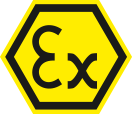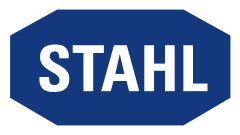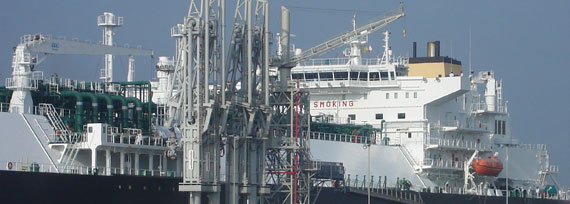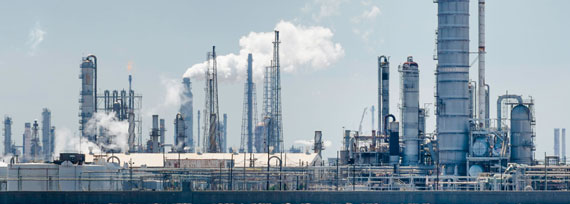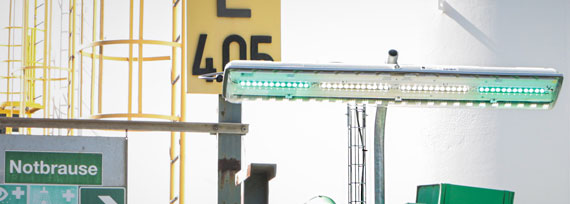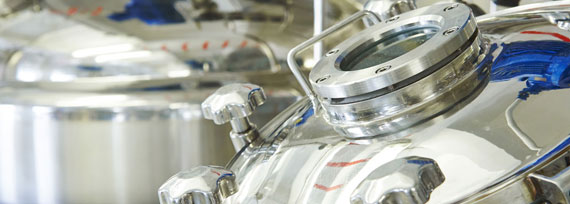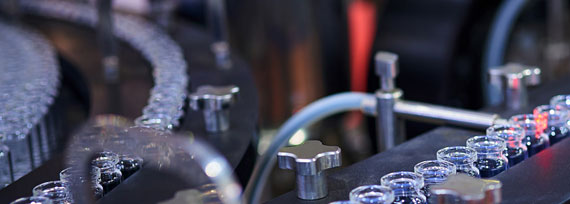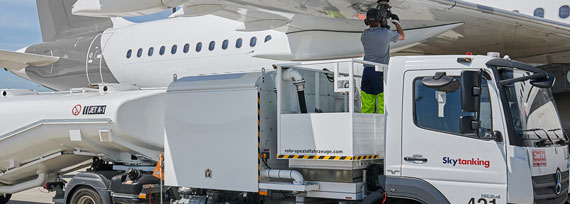Shark device platform provides practical explosion protection training at the Marl Chemical Park
Participating in interesting training while improving the safety of hazardous plants? Evonik's modernised training centre equipped with many R. STAHL components demonstrates how these two aspects can be brought together.
Practical explosion protection at Evonik
It's important to find out how to handle hazardous plants safely, and it's best to begin as early as possible. In the training centre at Evonik's site in Marl, 750 trainees in 12 different professions learn all there is to know about safe operation of large chemical plants at the Chemical Park. These include 400 chemical technicians, who will go on to have a particular focus on explosion protection in their future jobs. "Our training is geared towards realistic operating situations and practical applications, so we're like the 'driving school' for the Chemical Park," explains Rainer Steinkamp, a trainer at Evonik. "We produce real chemical products using the same procedures that will be used later at the Chemical Park. This means that the substances can be corrosive or even explosive, for example."
This is why training at Evonik not only involves imparting knowledge at the vocational school and in production operations, but also focuses on transferring theory into practice in the training centre. What's more, all trainees, and not just future chemical technicians and electronic engineers, must familiarise themselves with the topic of explosion protection. After all, almost every plant here at the Chemical Park contains a hazardous area. Using real components in the technical production centre, the trainees learn how electrical explosion protection works and how to deal with hot-work permits and approvals. Over the past few decades, the training has been continuously modernised with this in mind. Nowadays, the trainees start in the lab and then switch to larger plants, just like a scale-up. The plants and therefore also the volumes grow with each year of training. This means that, by the end of the training, the trainees are already working on plants that are similar to small production plants. Not only trainees from Evonik but also those from other companies based in the Marl Chemical Park in the surrounding area are trained on around 70 plants.
Just like in real life
The training centre has changed to reflect the impact digitisation is having on production companies. While pneumatic actuators and sensors prevailed in the 1970s and 80s, the current trend is moving towards digital process support. This is why, in September 2021, most of the plants in the training centre were completely redesigned and adapted to the new challenges facing the world of work. Not much time was left for this: The conversion began just after the last final examination in June on the old plant. The work was completed after eight weeks – right on time to start the new training year.
In their first and second years, the trainees already learn about the protective regulations, legislation, standards and ordinances, as well as how to deal with explosion protection in practice. At this stage, the trainees already work under Ex conditions and produce on a small scale. In their third and fourth years, the trainees are often in contact with business areas that require complete explosion protection. By this point, if not before, the trainees work in Zones 2, 1 and even 0 on a frequent or even daily basis.
Even before the modernisation, the equipment always included devices from R. STAHL. Due to the good experience Evonik has had with R. STAHL, the company is now using a wide variety of R. STAHL components. The Waldenburg-based company supplied almost all of the Ex hardware, including Shark screens, a Remote I/O system, lighting solutions including energy-saving LEDs, Ex keyboards and Ex mice, as well as motor protection and safety switches. "The benefit of R. STAHL is that the company offers the entire spectrum of explosion protection products and the components are compatible. This offered us many different options for designing our technical centre in a similar way to the Chemical Park," explains the training team. At the same time, more compact solutions were possible because, for example, several components could be installed in a single enclosure, dramatically reducing the cabling as well.
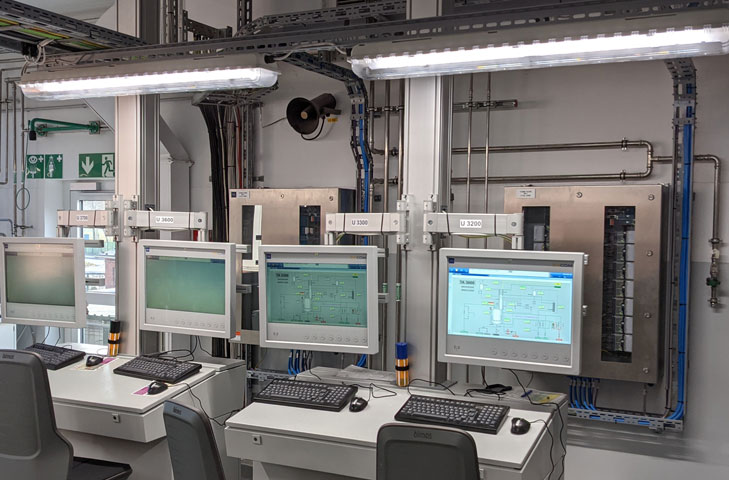
Experiencing everyday operation
Another advantage of the Shark screens is that the can be switched over to a second network. This firstly enables the trainees to monitor the distributed control system and operate the plants using the Shark HMI and secondly allows them to use the Evonik tools alongside Office applications. From the trainers' perspective, this offers brilliant possibilities. A new world of learning is created – for example when production sequences are displayed, which can be called up in newly opened windows for a better understanding within the work process in order clarify complex steps in the procedure.
Thirty four Shark screens, in different designs ranging from the panel PC version and thin clients through to stand-alone solutions, are now used in the training centre. There is a clear trend towards the thin client variant. It supports dual-screen functionality with dual touch operation in order to maintain an overview of numerous process images for all relevant sequences, even with an extremely high number of data points, while keeping the operating station fully functional. The display adapts smoothly to any screen size and resolution. The trainees describe how "we see this variant, which has a central server and a pared-back version in the field, in everyday use in production". The trainers emphasise another property – the robustness and long service life of the Shark range. At the end of the day, in the training centre it is assumed that the components will be used for many years, as is standard in chemical plants.
And that's not all – the same harsh ambient conditions also apply to the Shark device platform. The devices are shock-, vibration-, seawater- and salt-spray-resistant, have IP66 degree of protection and function in temperatures ranging from -40 °C to +65 °C, thanks to the integrated heater and innovative cooling and heat dissipation concept. The display and additional function keys are covered with a chemically hardened, non-glare glass pane. Not all of these properties are required in the training company. But the equipment has proved to be successful. "You can tell that the Shark devices were originally built for oil platforms. You can't underestimate how many different people use the plants every day. The device platforms still function without any problems and are stable. In this regard, the R. STAHL components are truly apprentice-proof," explains Steinkamp with a grin. "Having said that, our trainees notice the high quality and treat the components with the respect deserve"
For 30 years, explosion-protected Remote I/O systems from R. STAHL have been used for a wide range of process automation applications in Zone 1 and 2 as well as in Division 1 and 2. The compact stations are suitable for up to 120 signals. The pneumatic and Remote I/O system can also be combined in a single cabinet. They are also appreciated for their long service life which can endure more than 15 years of use in a wide temperature range. Ethernet interfaces make the systems ready for the future. They also allow for a redundant design, like in the real world of industrial chemical plants. This is why we also use the IS1+ systems in training at Evonik. The Remote I/O systems for training also feature an inspection glass so that the trainees can get an insight into the data processing technology.
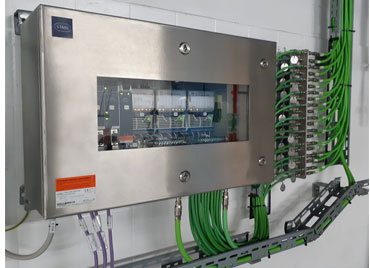
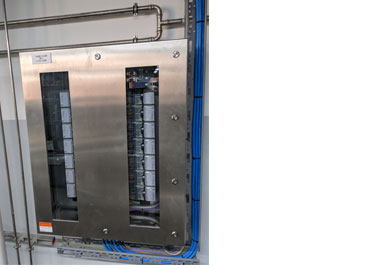
Conclusion and prospects
The chemical industry is always the focus of the public's attention. While this applies to environmental protection in particular, it is also true of explosion protection. Digitising the technical training centre with support from R. STAHL incurred huge costs. However, this investment will greatly benefit the Chemical Park, as the training for the companies involved in the production process is now state of the art.
The objective of the training is to enable the trainees to take responsibility in the many complex production companies at the Marl Chemical Park. It's clear that after their time in the training centre, the trainees are ideally prepared to deal with explosion protection in real operations. Following the modernisation, the training centre also offers excellent options for training purposes within Evonik.

